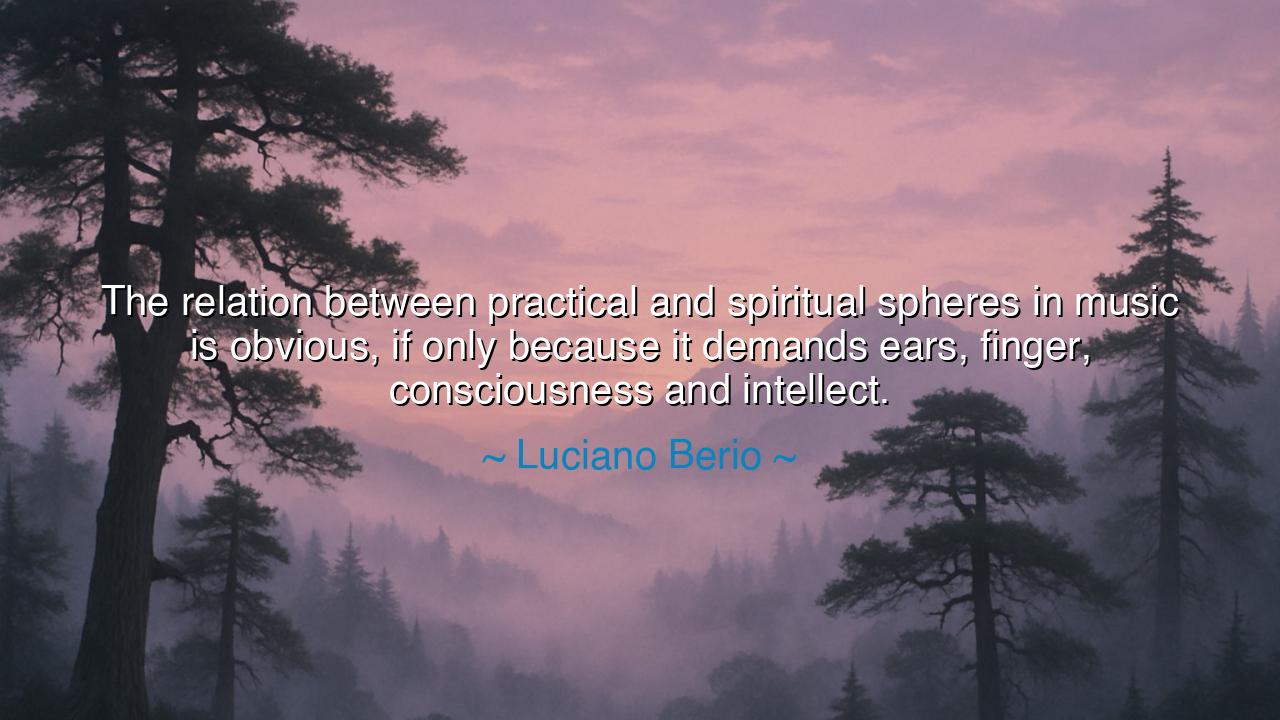
The relation between practical and spiritual spheres in music is
The relation between practical and spiritual spheres in music is obvious, if only because it demands ears, finger, consciousness and intellect.






Hear the words of the great composer Luciano Berio, who declared: “The relation between practical and spiritual spheres in music is obvious, if only because it demands ears, fingers, consciousness and intellect.” In this teaching, he reveals the dual nature of all art: it is both of the body and of the spirit, both labor and revelation, both discipline and transcendence. For music is not born from one realm alone—it demands the strength of the body, the clarity of the mind, and the soaring of the soul.
To play or create music is first a practical act. The fingers must be trained, the ears sharpened, the consciousness made alert to the smallest details. Countless hours of discipline and repetition shape the vessel of the musician, like the potter shaping clay. Yet within this discipline there emerges something that cannot be measured: the spiritual, the power of music to stir hearts, to open hidden doors in the soul, to call forth emotions and visions that transcend words. Thus Berio reminds us that the two are not separate but bound together, each completing the other.
Consider the story of Johann Sebastian Bach, whose music is revered not only for its mathematical perfection but also for its deep spirituality. His works demanded absolute mastery of craft, yet through this precision flowed divine expression. He himself said that the aim of music should be the glory of God and the refreshment of the soul. Here we see Berio’s truth: the practical and the spiritual are threads of the same fabric, woven together to create beauty that endures across centuries.
The ancients, too, knew this union. The Pythagoreans spoke of the music of the spheres, a harmony that existed both in numbers and in the soul. They believed that by disciplining the body and mind through scales and instruments, one could attune oneself to the eternal order of the universe. For them, as for Berio, the training of ears and fingers was not separate from the ascent of the spirit—it was the very path to it.
The meaning is profound: do not imagine that the spiritual can exist without the practical, or that the practical is meaningless without the spiritual. The artist who neglects technique may burn brightly for a moment, but their flame soon fades. The one who focuses only on craft without spirit creates lifeless sound. True greatness lies in the balance: the intellect guiding the hand, the consciousness opening the ear, and the soul breathing life into the work.
The lesson for us is this: in every endeavor, not only in music, the union of practical and spiritual is essential. In work, in love, in service, discipline must walk hand in hand with inspiration. To labor without vision is slavery; to dream without discipline is folly. But to unite both is to touch eternity. This is the path of mastery, whether of art, of leadership, or of the self.
Practical steps follow. Whatever your calling, give your body and mind to discipline—train your craft, sharpen your tools, practice with diligence. At the same time, never lose the flame of the spirit—seek meaning, connect your work to something higher, let your labor breathe with love and truth. Do not neglect ears that listen, fingers that practice, intellect that guides, and consciousness that elevates. When all these are joined, your work will transcend the ordinary and touch the eternal.
Thus the wisdom of Luciano Berio stands: “The relation between practical and spiritual spheres in music is obvious…” Take this not only as a truth for musicians but for all who labor and create. For in every field of life, greatness is born where discipline and spirit meet, where the hand and the heart work together, and where the earthly and the divine flow as one.






AAdministratorAdministrator
Welcome, honored guests. Please leave a comment, we will respond soon